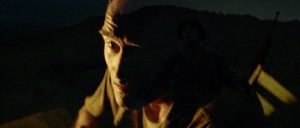The Thin Red Line (1998). Written and directed Terrence Malick. Starring James Caviezel, Sean Penn, Nick Nolte, and Elias Koteas. 170 mins; rated R. Metacritic: 78%; Rotten Tomatoes: 79%.
The big question, crisply and resonantly put, comes late in the film, though throughout it has echoed and ramified through people and events. It comes in voiceover, a stylistic choice used regularly by writer-director Terrence Malick, and in the war epic The Thin Red Line there are a host of voices, often one indistinguishable from the next, which is an effect Malick sought.
In this instance, the voice clearly comes from Private Witt, a foot soldier in Charlie Company, who throughout the film has pondered life’s larger questions of meaning and the possibility of divine care for the world. In any case, Guadalcanal is a hell of a place to do philosophy. Says Witt: “One man looks at a dying bird and thinks there’s nothing but undying pain, that death’s got the final word; it’s laughing at him; another man sees that same bird and feels the glory, feels something smiling through it.” Life is hell, or glory, or somehow both, and how to tell one from the other?
Soldier Witt is to the point, for sure. Hope against a grim reality, the very possibility of which in a war zone must seem like a cruel joke. In Witt’s burgeoning sense of a strange and palpable “glory,” splendor that displays even within the thickets of hell, will encompass him even as he too enters the reality of death in what is probably the most remarkable death sequence in the history of cinema. Nor is Witt alone.
There is as well an ordinary soldier, Beade (Nick Stahl), one who also does not have long to live. First, though, he is hunkered down in the tall grass, bullets flying overhead, and he bothers to look at the delicate intricacy of a leaf on a weed. The noise of combat fades as he is briefly enrapt in a beauty that intimates the reality of something beyond and other than the hell in which all these woe-begotten troops find themselves.

And then also there’s Captain Staros (Elias Koteas), who wishes only that his men not die needlessly, a desire that brings him to question the orders of his vainglorious superior, Colonel Tall (Nick Nolte), a long passed-over officer for whom victory is all that counts, an attitude encouraged, if not demanded by his superior, General Quintard (John Travolta). On the night before a major assault, Staros sits in candlelight in his tent beseeching God for wisdom and courage; the shot composition and lighting seem intentionally to echo the quiet luminescence imbued into Rembrandt’s portraits.

And as well, in his dire agony, Jesus in the Garden and, for that matter, on own his death rack beseeching Whomever to forgive those that have dealt this grisly execution. In short, splendor lies not merely in the natural world but within, and especially so, the marvel of the human creature. Witness the burgeoning self and soul of a toddler, and, well, be still. In Staros’ intercessory agony we glimpse the profound humanity of God himself, and that is quite enough.
The clearest display of this posture of being comes, strangely, the final glimpse of nihilistic Sergeant Welsh (Sean Penn), and then only in voiceover as a large contingent of troops leave Guadalcanal to fight and die on still another island. Throughout, from the second sequence onward, Welsh has pointedly question the “beautiful light” that Witt claims to see. He simply doesn’t know what to make of Witt’s seemingly fanciful claims of having sensed a world infused by some sort of “presence.” Kneeling at Witt’s grave, he ironically challenges his dear friend, “Where’s your spark now?”

To which, he offers (in voiceover) his own reluctant prayer/challenge, at once despairing and wistful, as his troops march past an American cemetery to board the ship that will deliver them from the island: “If I never meet you in this life, let me feel the lack. A glance from your eyes, and my life will be yours.”
As for Witt, his words—this time in post-mortem voiceover—are the film’s last: “All things shining.” Indeed.
In the end, the inestimable Malick seems to fashion a fresh, more cogent means of address to the question of the reality of a god than the very worn fear of hell, an appeal that has always addressed rank self-interest rather than the diffuse love of God for the whole of creation, and especially humankind (in this regard, see Helen Prejean’s counsel to the doomed Matthew Poncelet in Dead Man Walking). In particular, Malick seems to want to provide a different means of talking about religious experience and how belief might bloom within the self, even in the most dire of all circumstance. And in this startling and deeply moving drama of hope and love amid a battlefield, there is no talk of belief as a ticket out of hell, which is the usual and increasingly bad recourse of most evangelical Christianity. Rather, simply, a simple heartfelt doxology, “All things shining.”
Sign Up for Our Newsletter!
Insights on preaching and sermon ideas, straight to your inbox. Delivered Weekly!
Categorized into Death, Glory
The Thin Red Line (1998) – 1